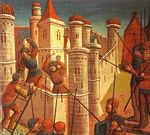Difference between revisions of "Template:Featured"
m (image, links) |
|||
| Line 4: | Line 4: | ||
</div> | </div> | ||
<!--nb. portrait images at ~100px, landscape images at ~200px--> | <!--nb. portrait images at ~100px, landscape images at ~200px--> | ||
| − | [[Image:Siege of Constantinople.jpg| | + | [[Image:Siege of Constantinople.jpg|150px|left]]The '''[[Fall of Constantinople]]''' was the conquest of that Greek city by the Ottoman Empire under the command of Sultan Mehmet II, on Tuesday, [[May 29]], 1453. This marked not only the final destruction of the [[Eastern Roman Empire|Eastern Roman ("Byzantine") Empire]], and the death of [[Constantine XI]], the last Roman Emperor, but also the strategic conquest crucial for Ottoman hegemony over the Eastern Mediterranean and Balkans. |
Scholars consider the Fall of Constantinople as a key event ending the Middle Ages and starting the Renaissance because of the end of the old religious order in Europe and the use of cannon and gunpowder. Down to the present day, many Greeks have considered Tuesday (the day of the week that Constantinople fell) to be the unluckiest day of the week. | Scholars consider the Fall of Constantinople as a key event ending the Middle Ages and starting the Renaissance because of the end of the old religious order in Europe and the use of cannon and gunpowder. Down to the present day, many Greeks have considered Tuesday (the day of the week that Constantinople fell) to be the unluckiest day of the week. | ||
Revision as of 22:39, August 11, 2006
Scholars consider the Fall of Constantinople as a key event ending the Middle Ages and starting the Renaissance because of the end of the old religious order in Europe and the use of cannon and gunpowder. Down to the present day, many Greeks have considered Tuesday (the day of the week that Constantinople fell) to be the unluckiest day of the week.
Recently featured: Seraphim of Sarov, The Ladder of Divine Ascent, John of Damascus, Lindisfarne, Edward the Martyr, Victor Pokrovsky, Akathist. Newly featured articles are presented every Saturday.
